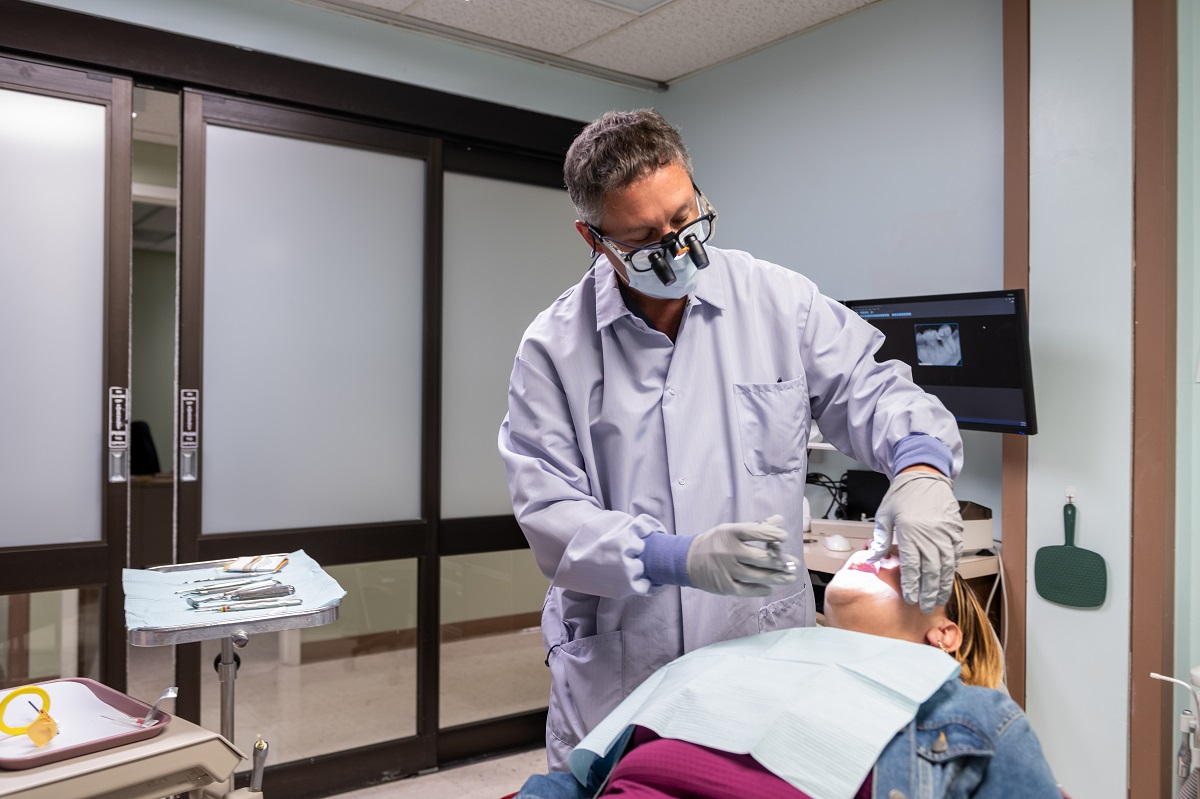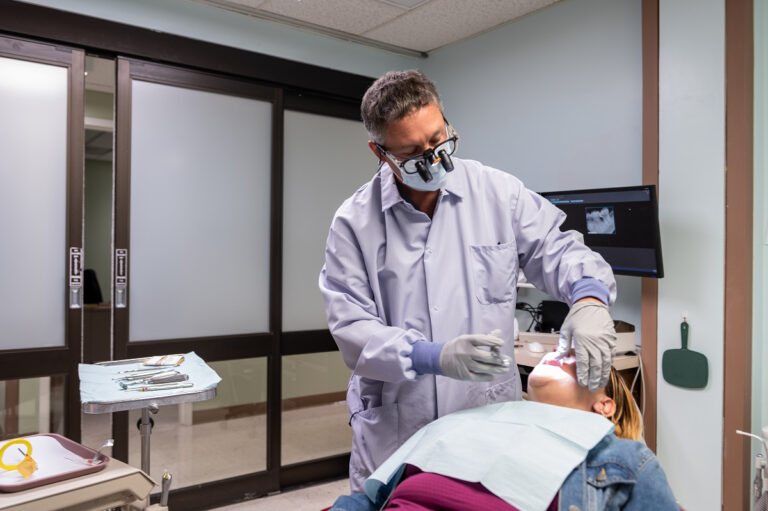
Dr. Christopher Kosensk prepares to extract Betsy Torres Ortiz's tooth in the dental office at Penn State Health St. Joseph Medical Center.
Does going to the dentist save you from having to go to the heart surgeon?
February 7, 2024
Medical science has a lot to say about how your cardiovascular health is affected by what you put in your mouth. Foods high in fat and sugar, tobacco and alcohol have been featured on heart clinics' most wanted posters for decades.
But what about the mouth itself?
“There's certainly a link,” says Dr. Andrew Waxler, a cardiologist at Penn State Health Medical Group Berks Heart. In fact, a 2016 study published in the Journal of Dental Research found that people with untreated dental infections are more likely to suffer from cardiovascular disease, including coronary artery disease, than those with healthy mouths. is 2.7 times higher.
However, what exactly the relationship is between oral health and heart health is still a mystery.
heart valve connection
Scientists have long known about the link between oral health and certain types of heart disease, Waxler said.
“We've known for years that people who have infections in their mouths, such as cavities or other problems, are at higher risk of developing what's called endocarditis,” he says. “That's a fancy way of saying heart valve infection.”
These valves are small plugs in the heart that help keep blood flowing between the ventricles without backflow. Infections can cause a variety of symptoms, including shortness of breath and chest pain, and in some cases can lead to death. Mild endocarditis can be treated with intravenous antibiotics, but in some cases surgery may be necessary.
Can toothache also occur?
“You can get strep from your mouth, and it can get into your bloodstream and get stuck in your valves, causing an infection,” Waxler says.
Can dental problems cause a heart attack?
A more recent discovery in medicine is the discovery that people with dental problems are at a significantly higher risk of developing problems not only with their heart valves, but also with their arteries. There may be a link between infections in the mouth and stiffening of the highway system that carries oxygen-rich blood to vital organs.
Atherosclerosis is the accumulation of fatty substances within the walls of blood vessels, causing blockages and eventually heart attacks.
Incidentally, the material that clogs arteries is called plaque, which is a completely different type of material than the kind that coats teeth and causes cavities, Waxler said. Eating lots of sugary foods can cause heart problems, but this is not the case. The biggest risk factor for heart disease is diabetes, he said.
So what's the connection between cavities and blocked arteries? Doctors aren't sure yet, but there's a theory, Waxler said.
Theory 1: Bacteria Bacteria that infect the gums and teeth (often strep, but sometimes other types) can invade the bloodstream and artery walls.
Autopsies of some people who died of heart attacks revealed DNA from different types of oral bacteria in the walls of blood vessels.
Theory 2: Inflammation. For example, if you have a chronic infection in your gums, there may be associated chronic inflammation elsewhere.
Over the past 30 years or so, studies have shown that people with high levels of inflammation in their bodies are more likely to have a heart attack or stroke. The idea is that an infection in the mouth can trigger an inflammatory response in the body. In response, the immune system can become overly aggressive, and arteriosclerosis occurs as a result of the irritation caused by that response.
“This actually makes more sense to me than bacteria,” Waxler said.
Theory 3: It's a coincidence. People who don't take care of their teeth are more likely to have bad habits that lead to heart disease. In this case, the artery problem has nothing to do with bacteria or inflammation. There is a relationship between dental health and heart health, such that people with severe dental problems are more likely to smoke or eat unhealthy foods.
What you can do
“If you decided to go to the dentist every three months and have the cleanest mouth in the world, would that help your heart?” Waxler asked. “I don't know if anyone really has an answer to that.”
Doctors are convinced of the big five. Diabetes, smoking, high cholesterol, high blood pressure, and a family history of heart disease are all risk factors for heart disease. If you want to prevent heart disease, there are many causes to consider before worrying about your teeth.
What would Mr. Waxler say to a patient who is worried that one day his teeth will bite through his heart?
“I tell them to see their dentist at least once a year, and ideally every six months,” Waxler says. “Brush your teeth. Floss your teeth. There's a direct correlation. I don't know why. But it can't hurt, right?”
You can hear Mr. Waxler discuss these health issues on the Berks County Medical Association radio show Health Talk. Weam 830. The program is broadcast on the first Wednesday of every month from 6pm.
Related content:
The Medical Minute is a weekly health news feature published by the Pennsylvania State Department of Health. Articles feature the expertise of faculty, physicians, and staff and are designed to provide timely, relevant health information of interest to a wide range of readers.
If you have trouble accessing this content or would like it in another format, please email Penn State Health Marketing & Communications.


